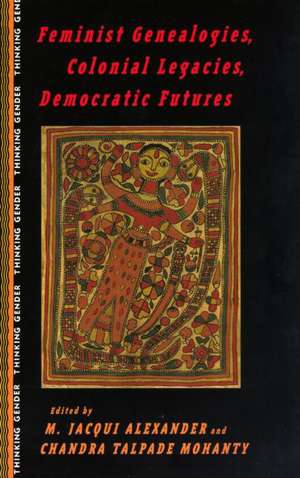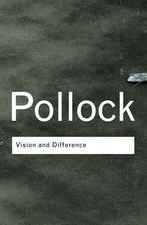Feminist Genealogies, Colonial Legacies, Democratic Futures: Thinking Gender
Editat de M. Jacqui Alexander, Chandra Talpade Mohantyen Limba Engleză Paperback – 20 noi 1996
Din seria Thinking Gender
-
 Preț: 385.55 lei
Preț: 385.55 lei -
 Preț: 399.45 lei
Preț: 399.45 lei -
 Preț: 380.07 lei
Preț: 380.07 lei -
 Preț: 332.19 lei
Preț: 332.19 lei -
 Preț: 391.39 lei
Preț: 391.39 lei - 28%
 Preț: 118.94 lei
Preț: 118.94 lei - 15%
 Preț: 492.75 lei
Preț: 492.75 lei -
 Preț: 448.49 lei
Preț: 448.49 lei -
 Preț: 411.42 lei
Preț: 411.42 lei -
 Preț: 476.01 lei
Preț: 476.01 lei -
 Preț: 408.45 lei
Preț: 408.45 lei - 15%
 Preț: 432.12 lei
Preț: 432.12 lei -
 Preț: 420.34 lei
Preț: 420.34 lei -
 Preț: 388.42 lei
Preț: 388.42 lei -
 Preț: 368.98 lei
Preț: 368.98 lei -
 Preț: 391.39 lei
Preț: 391.39 lei -
 Preț: 367.07 lei
Preț: 367.07 lei -
 Preț: 432.29 lei
Preț: 432.29 lei -
 Preț: 427.93 lei
Preț: 427.93 lei - 5%
 Preț: 231.67 lei
Preț: 231.67 lei -
 Preț: 362.82 lei
Preț: 362.82 lei
Preț: 424.16 lei
Nou
Puncte Express: 636
Preț estimativ în valută:
81.17€ • 88.14$ • 68.18£
81.17€ • 88.14$ • 68.18£
Carte tipărită la comandă
Livrare economică 22 aprilie-06 mai
Preluare comenzi: 021 569.72.76
Specificații
ISBN-13: 9780415912129
ISBN-10: 0415912121
Pagini: 464
Dimensiuni: 152 x 229 x 24 mm
Greutate: 0.64 kg
Ediția:New.
Editura: Taylor & Francis
Colecția Routledge
Seria Thinking Gender
Locul publicării:Oxford, United Kingdom
ISBN-10: 0415912121
Pagini: 464
Dimensiuni: 152 x 229 x 24 mm
Greutate: 0.64 kg
Ediția:New.
Editura: Taylor & Francis
Colecția Routledge
Seria Thinking Gender
Locul publicării:Oxford, United Kingdom
Recenzii
"Feminist Genealogies has a transnational orientation, drawing together essays from places as diverse as a the Philippines, Nigeria, and Jamaica. After reading Feminist Genealogies, one is left with a feeling of hope about the possibility of "democratic futures"..." -- NWSA Journal
"Feminist Genealogies calls upon us to rethink feminist theories and practices within a complex intersectional and transnational framework. In contesting prevailing notions of global feminism, which tend to depart from resistance practices crafted in the West, Alexander and Mohanty have chosen essays that create new and provocative conversations among activist women involved in important transformative political projects in Asia, Africa, Europe, and North America. These conversations demand that we think deeply about advanced capitalist relations and how they reproduce and are reproduced through forms of domination that are sexualized, gendered, and racialized. This timely collection of essays should stimulate new discussions about feminist political engagement and about feminist organizing practices as ways of envisioning and struggling for democratic futures." -- Angela Y. Davis, University of California Presidential Chair in African American and Feminist Studies
"Feminist Genealogies calls upon us to rethink feminist theories and practices within a complex intersectional and transnational framework. In contesting prevailing notions of global feminism, which tend to depart from resistance practices crafted in the West, Alexander and Mohanty have chosen essays that create new and provocative conversations among activist women involved in important transformative political projects in Asia, Africa, Europe, and North America. These conversations demand that we think deeply about advanced capitalist relations and how they reproduce and are reproduced through forms of domination that are sexualized, gendered, and racialized. This timely collection of essays should stimulate new discussions about feminist political engagement and about feminist organizing practices as ways of envisioning and struggling for democratic futures." -- Angela Y. Davis, University of California Presidential Chair in African American and Feminist Studies
Cuprins
Colonial Legacies, Capitalist State Practice, and Feminist Movements; Chapter 1 Women Workers and Capitalist Scripts: Ideologies of Domination, Common Interests, and the Politics of Solidarity, Chandra Talpade Mohanty; Chapter 2 “A Great Way to Fly”: Nationalism, the State, and the Varieties of Third-World Feminism, Geraldine Heng; Chapter 3 Sheroes and Villains: Conceptualizing Colonial and Contemporary Violence Against Women in Africa, Amina Mama; Chapter 4 Erotic Autonomy as a Politics of Decolonization: An Anatomy of Feminist and State Practice in the Bahamas Tourist Economy, M. Jacqui Alexander; Chapter 5 Civil Rights versus Sovereignty: Native American Women in Life and Land Struggles, Marie Anna Jaimes Guerrero; Crafting Selves, Reimagining Identities and Cultures; Chapter 6 Postmodernism, “Realism,” and the Politics of Identity: Cherríe Moraga and Chicana Feminism, Paula M. L. Moya; Chapter 7 Probing “Morality” and State Violence: Feminist Values and Communicative Interaction in Prison Testimonios in India and Argentina, Kavita Panjabi; Chapter 8 Toward a Genealogy of Black Female Sexuality: The Problematic of Silence, Evelynn M. Hammonds; Chapter 9 Post–Third-Worldist Culture: Gender, Nation, and the Cinema, Ella Shohat; Anatomies of Organizing, Building Feminist Futures; Chapter 10 Ring Ding in a Tight Corner: Sistren, Collective Democracy, and the Organization of Cultural Production, Honor Ford-Smith; Chapter 11 Looking at Ourselves: The Women's Movement in Hyderabad, Vasanth Kannabiran, Kalpana Kannabiran; Chapter 12 The Dynamics of WINning: An Analysis of Women in Nigeria (WIN), Ayesha M. Imam; Chapter 13 The Public/Private Mirage: Mapping Homes and Undomesticating Violence Work in the South Asian Immigrant Community, Anannya Bhattacharjee; Chapter 14 One Finger Does Not Drink Okra Soup: Afro-Surinamese Women and Critical Agency, Gloria Wekker;
Notă biografică
M. Jacqui Alexander, Chandra Talpade Mohanty



















